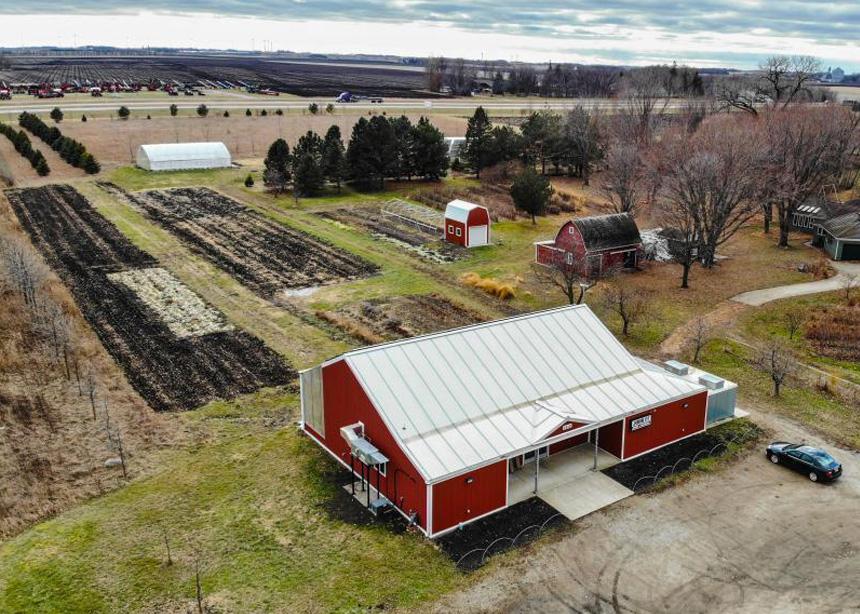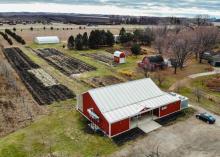For John Stoesz, making land reparations to Indigenous communities is a way to follow Jesus.
In 2012, Stoesz’s family sold his grandparents’ farm near Mountain Lake, Minnesota. Stoesz returned half the proceeds of his share of the inheritance to Indigenous groups working for land justice.
Mountain Lake is in the southwestern part of the state. Many of the early settlers in the area were German Mennonites, including Stoesz’s paternal great-grand[1]parents. These settlers were attracted by the offer of “free land,” made available through the Homestead Act of 1862 after almost all the Dakota people of Minnesota were killed or forced out.
“I don’t believe that my ancestors directly participated in the wrongdoing, but [they] benefited from it,” Stoesz says during a video call. “So the question is: What do you do with an unjust benefit?”
When he received the inheritance, Stoesz was the executive director of Mennonite Central Committee (MCC) Central States. At that point, he and his colleagues were five years into a journey of following Indigenous leadership on justice issues.
That journey included the formation of a visioning circle made up of three or four Indigenous people and three or four non-Indigenous people, whose purpose was “to identify and resource Indigenous strength and genius while staying on the path of decolonization and relationship.”
As he was about to collect his inheritance, Stoesz spoke about it with the visioning circle. One of the circle’s members was Harley Eagle, a Dakota/ Ojibway man whose paternal ancestors fled Minnesota when the Dakota peoples were removed from the land according to state policy.
Eagle put Stoesz in touch with Waziyatawin, executive director of Makoce Ikikcupi, a nonprofit focused on land recovery.
Eagle also suggested that Stoesz give some of the inheritance to Sarah Augustine, a Pueblo (Tewa) descendant who was working to repudiate the Doctrine of Discovery. (Augustine has since co-founded, and become the executive director of, the Coalition to Dismantle the Doctrine of Discovery.)
Stoesz divided the money between Makoce Ikikcupi and Augustine.
The former appealed to him because it is creating a place in Minnesota where Dakota people can re-establish their spiritual and physical relationship with their homeland, and ensure the ongoing existence of their people.
The latter appealed to him because Augustine does work on a national level to replace unjust structures with just structures.
“I think you have to do both [local and national work] in order to resolve some of these issues,” Stoesz says.
Inspired by Zacchaeus
Stoesz’s decision to return half of his inheritance was inspired by the biblical story of Zacchaeus, the rich tax collector who decided that following Jesus meant making a big change.
Zacchaeus returned half his wealth to the poor and repaid those he defrauded fourfold.
“If you benefit from an oppressive system and you decide to follow the love ethic of Jesus, you must make amends to those oppressed by that system,” Stoesz says.
Today, he continues to work with Makoce Ikikcupi.
The organization has two villages: Zani Otunwe (Village of Wellness) is a 21-acre parcel located in Granite Falls, Minnesota, and Hohwoju Otunwe (Village of Vibrant Growth) is a 20-acre parcel in Mountain Lake.
Stoesz is also involved with the Coalition to Dismantle the Doctrine of Discovery and its repair network, which supports church communities in education, solidarity and reparative action alongside Indigenous peoples.
Doing work related to land reparations has deepened Stoesz’s faith.
“In returning a part of my land inheritance I discovered healing for myself,” he says. “This is a growing awareness that the meaning of life is not found in accumulation of material wealth, but in right relationships with others, including the original people of this land; with nature; and with the Creator.”
Revitalization
Because non-Indigenous society was responsible for taking the land, destroying Indigenous cultures (especially through boarding schools) and polluting the environment, Stoesz says that the goal of land reparations is returning land to Indigenous groups, revitalization of Indigenous cultures and renewal of the environment.
Stoesz notes that the General Conference Mennonite Church (a predecessor to Mennonite Church Canada and Mennonite Church USA) supported two Indian boarding schools in the U.S. while at the same time establishing postsecondary institutions like Bethel College, Tabor College and Hesston College.
“I don’t know that anyone at that time saw the irony between starting educational institutions to preserve German Mennonite culture and at the same time operating Indian boarding schools to forcibly take away the language and the culture of Indigenous children,” he says.
“My German Mennonite ancestors came to Minnesota largely because they wanted to practice their own culture, speak their own language and practice their own spirituality, their own religion,” he adds. “Now we who have benefited from the taking of Indigenous lands and languages and cultures have a responsibility to see to it that there can be a revitalization of Indigenous language and culture. And of course, to make that happen, there has to be a land base for these Indigenous groups to do that.”
Stoesz has an intensity and drive while at the same time remaining invitational, says Jonathan Neufeld, Indigenous relations coordinator at Mennonite Church Canada.
“He’s convinced of what is right and what is needed from the church and from settler communities to right the wrongs of [our] colonial past, but he comes alongside people who are exploring that with deep listening and profound challenge,” says Neufeld, who has known Stoesz for a decade.
“He’s inviting people into healing, and he has a way of calling people in that I think is beautiful.” Stoesz has given many presentations about Indigenous justice over the years, and one thing he stresses is that the work of land reparation is not an all-or-nothing proposition.
“It may be unrealistic to return all the land,” he says, “but it is unjust to return none.”





Comments
Wow.
Add new comment
Canadian Mennonite invites comments and encourages constructive discussion about our content. Actual full names (first and last) are required. Comments are moderated and may be edited. They will not appear online until approved and will be posted during business hours. Some comments may be reproduced in print.